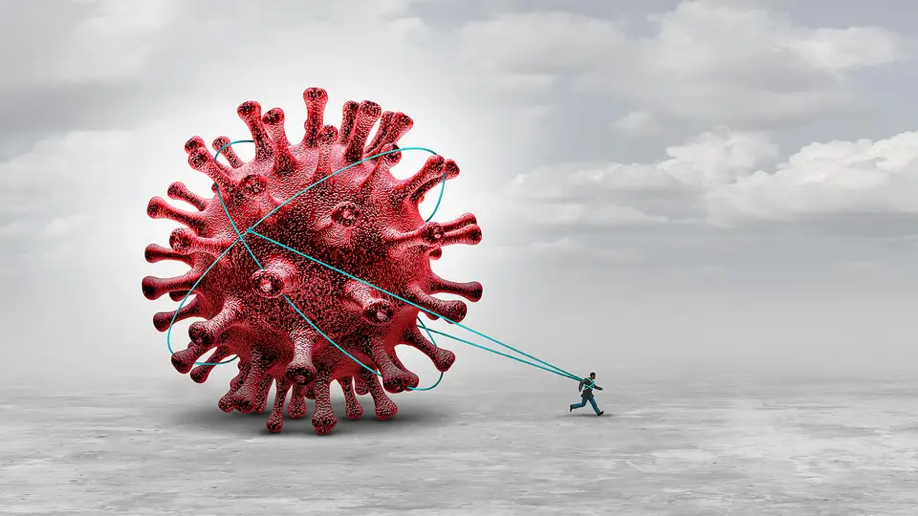Portal, AZ - Rodeo, NM
Serving The Communities Of Portal and Rodeo (www.portal-rodeo.com)
Serving The Communities Of Portal and Rodeo (www.portal-rodeo.com)

CoronavirusVirus Update

New AI tool can predict viral variants, ID most dangerous, help make vaccines ‘future-proof’
The COVID-19 pandemic seemed like a never-ending parade of SARS-CoV-2 variants, each equipped with new ways to evade the immune system, leaving the world bracing for what would come next.
But what if there were a way to make predictions about new viral variants before they actually emerge?
A new artificial intelligence tool named EVEscape, developed by researchers at Harvard Medical School and the University of Oxford, can do just that.
The tool has two elements: A model of evolutionary sequences that predicts changes that can occur to a virus, and detailed biological and structural information about the virus. Together, they allow EVEscape to make predictions about the variants most likely to occur as the virus evolves.
In a study published Wednesday in Nature, the researchers show that had it been deployed at the start of the COVID-19 pandemic, EVEscape would have predicted the most frequent mutations and identified the most concerning variants for SARS-CoV-2. The tool also made accurate predictions about other viruses, including HIV and influenza.
The researchers are now using EVEscape to look ahead at SARS-CoV-2 and predict future variants of concern; every two weeks, they release a ranking of new variants. Eventually, this information could help scientists develop more effective vaccines and therapies. The team is also broadening the work to include more viruses.
“We want to know if we can anticipate the variation in viruses and forecast new variants — because if we can, that’s going to be extremely important for designing vaccines and therapies,” said senior author Debora Marks, professor of systems biology in the Blavatnik Institute at HMS.
From EVE to EVEscape
The researchers first developed EVE, short for evolutionary model of variant effect, in a different context: gene mutations that cause human diseases. The core of EVE is a generative model that learns to predict the functionality of proteins based on large-scale evolutionary data across species.
In a previous study, EVE allowed researchers to discern disease-causing from benign mutations in genes implicated in various conditions, including cancers and heart rhythm disorders.
“Viruses are flexible — it’s almost like they’ve evolved to evolve.”
“You can use these generative models to learn amazing things from evolutionary information — the data have hidden secrets that you can reveal,” Marks said.
As the COVID-19 pandemic hit and progressed, the world was caught off guard by SARS-CoV-2’s impressive ability to evolve. The virus kept morphing, changing its structure in ways subtle and substantial to slip past vaccines and therapies designed to defeat it.
“We underestimate the ability of things to mutate when they’re under pressure and have a large population in which to do so,” Marks said. “Viruses are flexible — it’s almost like they’ve evolved to evolve.”
Watching the pandemic unfold, Marks and her team saw an opportunity to help: They rebuilt EVE into a new tool called EVEscape for the purpose of predicting viral variants.
They took the generative model from EVE — which can predict mutations in viral proteins that won’t interfere with the virus’s function — and added biological and structural details about the virus, including information about regions most easily targeted by the immune system.
“We’re taking biological information about how the immune system works and layering it on our learnings from the broader evolutionary history of the virus,” explained co-lead author Nicole Thadani, a former research fellow in the Marks lab.
Such an approach, Marks emphasized, means that EVEscape has a flexible framework that can be easily adapted to any virus.
Turning back the clock
In the new study, the team turned the clock back to January 2020, just before the COVID-19 pandemic started. Then they asked EVEscape to predict what would happen with SARS-CoV-2.
“It’s as if you have a time machine. You go back to day one, and you say, I only have that data, what am I going to say is happening?” Marks said.
The tool was able to sift through the tens of thousands of new SARS-CoV-2 variants produced each week and identify the ones most likely to become problematic.
EVEscape predicted which SARS-CoV-2 mutations would occur during the pandemic with accuracy similar to this of experimental approaches that test the virus’ ability to bind to antibodies made by the immune system. EVEscape outperformed experimental approaches in predicting which of those mutations would be most prevalent. More importantly, EVEscape could make its predictions more quickly and efficiently than lab-based testing since it didn’t need to wait for relevant antibodies to arise in the population and become available for testing.
Additionally, EVEscape predicted which antibody-based therapies would lose their efficacy as the pandemic progressed and the virus developed mutations to escape these treatments.
The tool was also able to sift through the tens of thousands of new SARS-CoV-2 variants produced each week and identify the ones most likely to become problematic.
“By rapidly determining the threat level of new variants, we can help inform earlier public health decisions,” said co-lead author Sarah Gurev, a graduate student in the Marks lab from the Electrical Engineering and Computer Science program at MIT.
In a final step, the team demonstrated that EVEscape could be generalized to other common viruses, including HIV and influenza.
Designing mutation-proof vaccines and therapies
The team is now applying EVEscape to SARS-CoV-2 in real time, using all of the information available to make predictions about how it might evolve next.
The researchers publish a biweekly ranking of new SARS-CoV-2 variants on their website and share this information with entities such as the World Health Organization. The complete code for EVEscape is also freely available online.
They are also testing EVEscape on understudied viruses such as Lassa and Nipah, two pathogens of pandemic potential for which relatively little information exists.
We want to figure out how we can actually design vaccines and therapies that are future-proof.
Such less-studied viruses can have a huge impact on human health across the globe, the researchers noted.
Another important application of EVEscape would be to evaluate vaccines and therapies against current and future viral variants. The ability to do so can help scientists design treatments that are able to withstand the escape mechanisms a virus acquires.
“Historically, vaccine and therapeutic design has been retrospective, slow, and tied to the exact sequences known about a given virus,” Thadani said.
Noor Youssef, a research fellow in the Marks lab, added, “We want to figure out how we can actually design vaccines and therapies that are future-proof.”